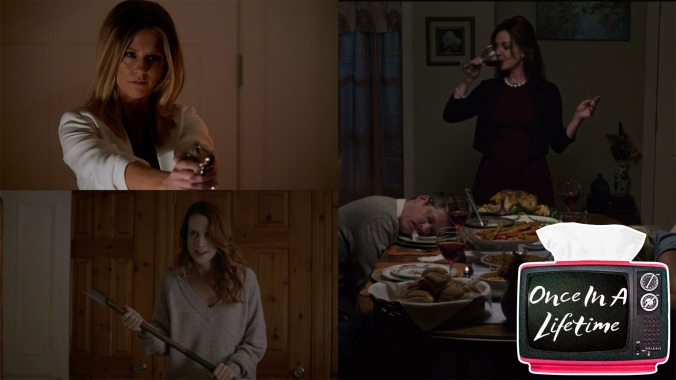In the paranoid world of Lifetime movies, a Psycho lurks around every corner
Image: Graphic: The A.V. ClubScreenshot: Lifetime Movie Club/Hulu
White suburban paranoia that they are coming to destroy everything you love isn’t just the cornerstone of the modern Republican party—it’s also a staple of Lifetime movies. Lifetime’s cinematic coffers overflow with unstable obsessives out to ruin lives, all driven by no more complicated a motive than raging jealousy over a wholesome routine of church picnics, cutesy signs from HomeGoods, and weekly missionary with the lights off. A simple keyword search for every lying boyfriend’s favorite insult for a woman who wasn’t willing to put up with his shit anymore turns up more than a dozen titles, each evoking a different phase of life and level of intimacy: Psycho BFF. Psycho Ex-Girlfriend. Psycho Daughter. Psycho Granny. Psycho In-Law. Psycho Mother-In Law. Psycho Brother-In-Law. Engaged To A Psycho. Psycho Nurse. My Daughter’s Psycho Friend. Psycho Prom Queen. InstaPsycho. Psycho Yoga Instructor. Psycho Escort. Psycho Stripper. Psycho Party Planner. Psycho Wedding Crasher. The Psycho She Met Online.
That all of this is wildly stigmatizing towards people with mental illnesses—especially widely misunderstood diagnoses like borderline personality disorder and bipolar disorder—is so obvious that it barely needs to be stated. And to be fair to the writers and directors, Lifetime does have a habit of changing the titles of films it acquires for maximum salaciousness. (Psycho Granny’s original title was Lineage Of Lies, for example.)
It’s a revealing detail, one that bolsters the argument for Lifetime as the female-driven, at-home grindhouse of today—as does the network pairing with notorious schlockmeisters The Asylum for Psycho BFF, a.k.a American Psychos. Like those now-romanticized cinematic trash heaps of yesterday, Lifetime is driven by quick-and-dirty productions and cheap thrills. And much as exploitation producers of the 1970s appealed to the violent fantasies of men who were—consciously or subconsciously—both titillated and threatened by women’s liberation, so do Lifetime executives lure in middle- and upper-middle-class white women primed by American exceptionalism to believe that their lifestyles are the envy of the world.
But although the paranoia that fuels this particular subcategory of Lifetime movies mirrors the fear that drives American conservatism, the network’s motives don’t appear to be political in nature. In classic huckster fashion, they’re just taking advantage of the cultural moment. Also like ’70s exploitation, the content of these films very much reflects our particular moment, constructing a centrist version of contemporary white womanhood where people of color are accepted, if they stick to a narrow range of subservient roles (Lifetime movies are rife with the “Black best friend” stereotype); where sexuality is celebrated, if it stays within committed, monogamous parameters (interestingly, both the Psycho Stripper and Psycho Escort are male sex workers obsessed with female clients); and where ambition is encouraged, as long as it doesn’t overshadow motherhood (or else your kid might run away with My Daughter’s Psycho Friend while you’re at work). Similar to the Black best friend who exists only to support the white protagonist, characters of lower socioeconomic status are also relegated to marginal roles—indeed, the terror in many of these films revolves around hired help, like a nanny or a home care worker, overstepping their “place.”
This topicality may be why, amid all the winking and nudging, glimmers of therapy culture shine through in some of these films, much like the checklists of red flags dramatized in Lifetime movies about domestic abusers. In the 2018 French-Canadian production Psycho Ex-Girlfriend (a.k.a. Twisted), for example, the lead character, Kara (Elisabeth Harnois), is a counselor. And all of her responses to the reappearance of her fiancé Tyler’s (Morgan Kelly) newly sober sexpot ex Elle (Kimberly-Sue Murray) in their lives are by the book.
She keeps a detailed log of their every encounter, in order to facilitate a restraining order down the road. She shows up herself when Elle calls Tyler in the middle of the night, claiming to have swallowed a lethal dose of prescription medication. She offers to treat Elle as a patient in order to save dopey Tyler the emotional work of confronting Elle, which is really just above and beyond. (It’s not as baffling as the scene where Kara flips through a blank kitten calendar, pausing to chuckle at a particularly cute cat, though.) None of that stops Elle from crashing through the window of Kara’s kitchen with an axe like a slasher villain just prior to the film’s very confusing ending, but this is a movie, after all.
Although fascinating to contemplate, the politics of Lifetime’s Psycho movies are easier to set aside than in the evil-husband ones, not least because of the absurdity of the circumstances. An abusive spouse is a depressing reality; a party planner who becomes obsessed with your teenage daughter while planning her a lavish Sweet 16 party paid for by money from the art gallery you own? Well, first you’d have to own your own art gallery, wouldn’t you? That leads us to Psycho Party Planner (2020), a film that knows its premise is ridiculous, its performances over the top, and its twists visible from space. The art, meanwhile, is hipper than you might think for set decoration in a Lifetime movie, but just slightly.

 Keep scrolling for more great stories.
Keep scrolling for more great stories.